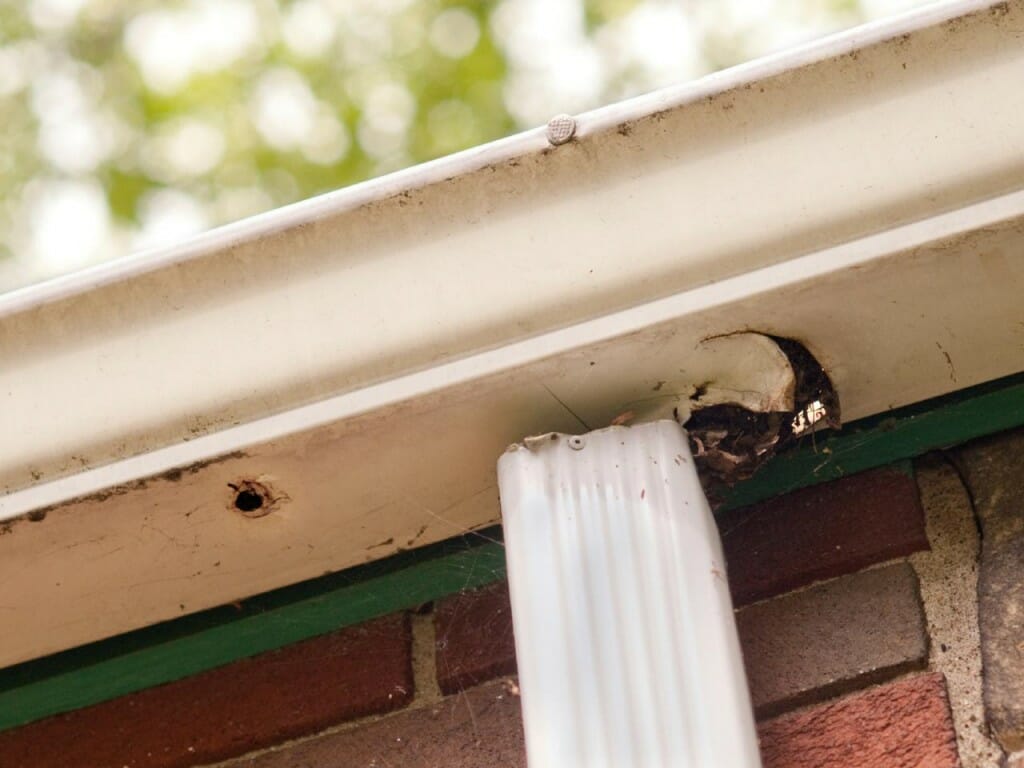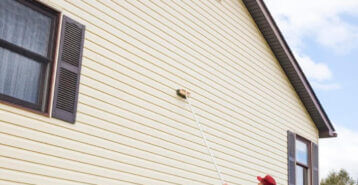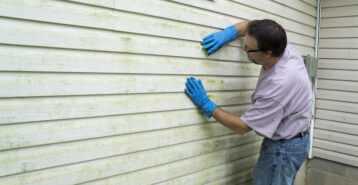Are you doing a gutters project?
Modernize can pair you with three to four pros in your area, so you can compare options and save time and money.
Cleaning Out Your Gutter System
Have you ever wondered where all the water goes during heavy rain or when snow melts at the end of winter? In most homes, water doesn’t just fall from the roof to the ground. Gutters and downspouts carry it away from basements, decks, and other parts of your house. This helps prevent water from seeping in and causing damage.
Clearing leaves, branches, and other debris from your gutters and downspouts is an important maintenance job. If you keep them clean, your home will be better protected throughout the year.
Why Should You Clean Your Gutters?
If you don’t clean your gutters, they will eventually clog. Water can then overflow and run onto your home, causing damage and even leaks inside. Besides checking for rainwater, watch for ice dams and leaks in winter, and call a professional if needed.
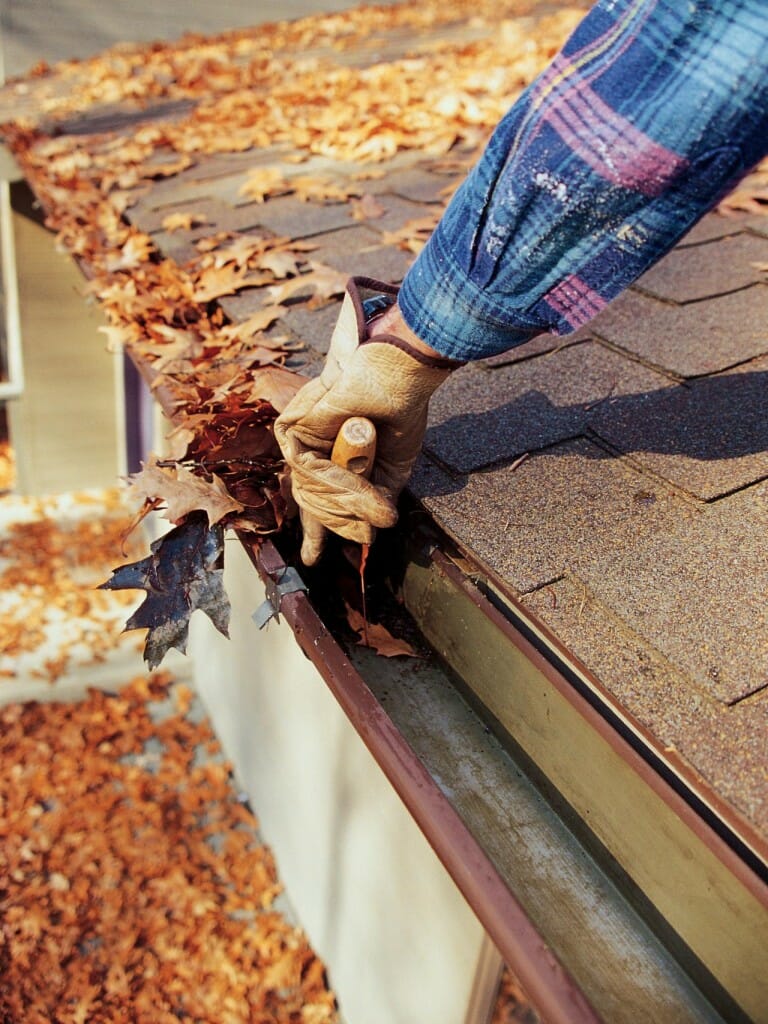
How Often Should You Clean Gutters?
For most homes, cleaning your gutters and downspouts twice a year is enough: once at the end of spring and again after the leaves have fallen in late fall. These are the times when clogs are most likely, so cleaning then helps the most.
If you live in a heavily wooded area, it’s a good idea to check for debris more often. You should also get your gutters ready before any heavy rain or storms are expected.
How to Clean Gutters and Downspouts
Cleaning gutters and downspouts is pretty simple, but you need to be comfortable using a ladder.
Steps to Prepare
Make sure you’re prepared before cleaning gutters so you don’t hurt yourself or damage the gutters.
What to Wear:
- Long pants and long sleeves: Even if it’s warm, covering your skin protects you from debris and the sun.
- Shoes with good grip: Since you’ll be on a ladder, wear shoes that won’t slip.
- Gloves: Gutters can hold more than just leaves, like bird droppings, screws, or sharp metal. Gloves protect your hands.
- Safety goggles and mask: Debris can fly up while you clean, so protect your eyes, mouth, and nose.
Tools You’ll Need:
- Ladder
- Garden trowel or gutter scoop
- Plastic tarp
- Garden hose with spray nozzle
- Medium-stiff brush
- Pressure washer (optional)
Step-by-Step: How to Clean Your Gutters
- Lay out a plastic tarp on the ground below where you’ll be working.
- Place your ladder on stable ground and climb up.
- Scoop out debris from the gutters with the trowel or your hands onto the plastic tarp below.
- Flush out the remaining debris with a hose or a pressure washer. Rinse until the water runs clear.
Can You Clean Your Gutters From the Ground?
If your house is tall or you’re not comfortable on a ladder, you might be able to clean your gutters from the ground.
- Dry debris can be blown out using a leaf blower with a telescopic attachment.
- A wet/dry vac can also be used to vacuum out debris.
- A regular garden hose with a gutter extension can work for cleaning from the ground, but it may not be enough if debris is stuck on.
- A pressure washer with a gutter cleaning attachment is also effective for blasting away dirt and debris.
You can clean your gutters yourself, but hiring a professional is often safer and more thorough. Professionals have the right equipment to do the job well and safely
Checking the System
After cleaning the gutters, you will want to check for additional problems. When you flush the system with water, look for any leaks or pools. If the water flows naturally without slowing at any point, you should be finished with your gutter maintenance. Pooling water indicates a blockage somewhere, and leaking indicates a hole or a failed seal in the system. If you are unsure whether your gutters are clear, we recommend contacting a professional to avoid issues down the road.
Handling Downspout Clogs
If water pools at the start of a downspout, there’s a clog inside the tube. This is a serious problem that needs to be fixed.
Find the Right Contractor for Your Gutters Project
Whether you’re ready to begin your project now or need some expert advice, our network of contractors are here to help. With a few simple questions, we’ll find the best local professionals for you
Use a plumber’s drain snake or auger to clear the downspout and break up the clog. Run the tool through the downspout a few times at different angles, moving it around and turning it where you feel resistance. That’s probably where the clog is.
After you’ve used the snake to clear the spout, run water through the downspout to wash out any loose debris and open up the passage. If water doesn’t pool during this step, you’ve cleared the blockage.
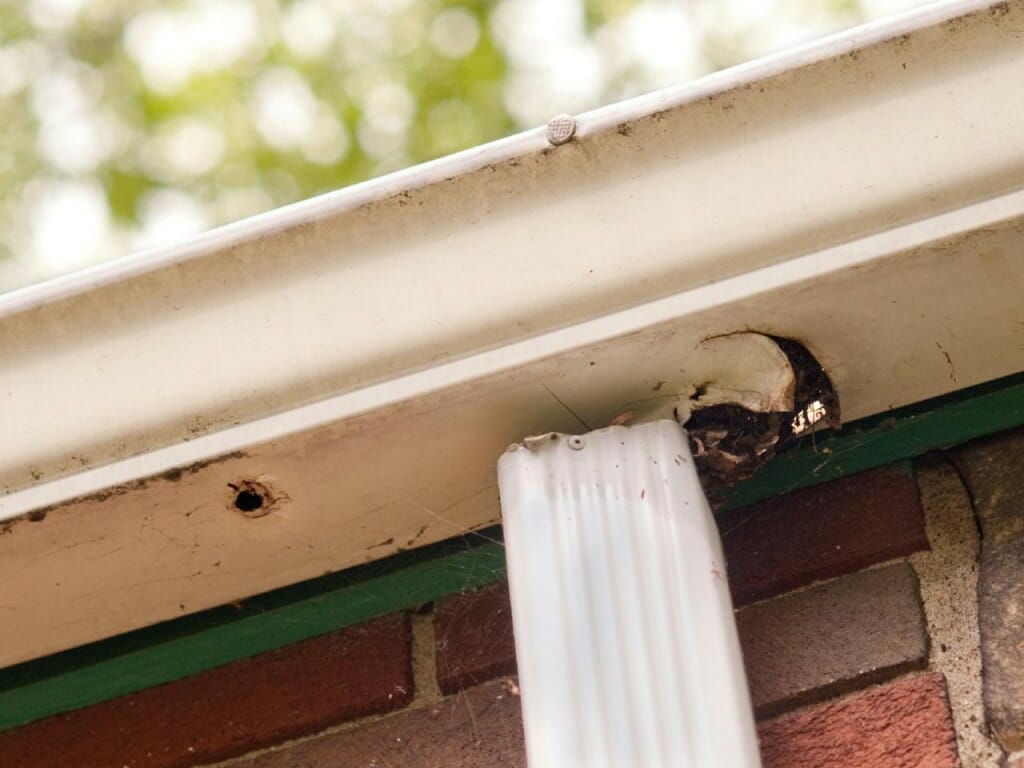
Taking Care of Potential Holes
Over time, holes can form in your home’s downspouts or gutters. The best way to find them is to use the “flush trick” and run water through the system. Have someone watch the gutters for leaks as you do this. If you spot any leaks, make a note of where they are so you can check them later.
Sealing Pinholes
Over time, it’s common for pinholes caused by rust and corrosion to develop in a gutter or downspout. These aren’t a big problem if you can find and seal them. You can close the holes with basic roofing cement, so it’s helpful to keep some on hand.
To seal pinholes, clean the area with a stiff wire brush, then apply a small amount of roofing cement over the hole. Use a putty knife to smooth it out so water and debris can flow without catching.
Sealing Larger Holes
For larger holes in your gutters, patch the area with metal flashing. Clean a few inches around the hole with a stiff wire brush so the roofing cement will stick. Cut a piece of flashing, ideally from the same metal as your gutters, so it’s a bit bigger than the hole. Place the patch in the gutter and seal it at two points.
First, put roofing cement under the patch and press it firmly in place to keep it secure and stop debris from getting underneath. Then add a line of roofing cement along each outside seam of the patch, and use a putty knife to smooth it out. Shape the cement so it forms a ramp that is even with the gutter, goes over the patch, and then returns to the gutter’s surface. This way, water and debris can flow over the patch without catching or leaking underneath.
If you get a large hole in a downspout or an elbow connection in your system, it is better to replace the specific section than the entire system.
How Much Does Professional Gutter Cleaning Cost?
While gutter cleaning is usually an easy DIY task, some homeowners prefer to hire a professional. A professional service saves you time and effort, and you can be sure the job is done right. It’s also fairly affordable and only needs to be used two or three times a year.
Professional gutter cleaning usually costs between $0.42 and $0.77 per linear foot. For an average 1,600-square-foot home, that’s about $100 per session. To find out more, contact a local professional and ask about gutter cleaning costs in your area.
Find the Right Contractor for Your Gutters Project
Whether you’re ready to begin your project now or need some expert advice, our network of contractors are here to help. With a few simple questions, we’ll find the best local professionals for you
Reviews from Real Homeowners
Welcome to Homeowner Resources! We are the Modernize blog. Modernize pairs more than 3 million homeowners a year with pre-vetted contractors in their area. This blog started because we believe homeowners should know everything about their homes, from how their HVAC works to which front door colors they might love. On Homeowner Resources, you can find information on every part of your home, right down to how you can negotiate with contractors to get the best price. Here's more about the blog.
Need a contractor? Learn more about how Modernize finds the right pro for you.
